
Living for Change is a weekly newsletter that provides the perspective and activities of the Boggs Center and related organizations. Thinking for Ourselves is a weekly column exploring issues in Detroit and around the Country. The column was originally published in the Michigan Citizen.
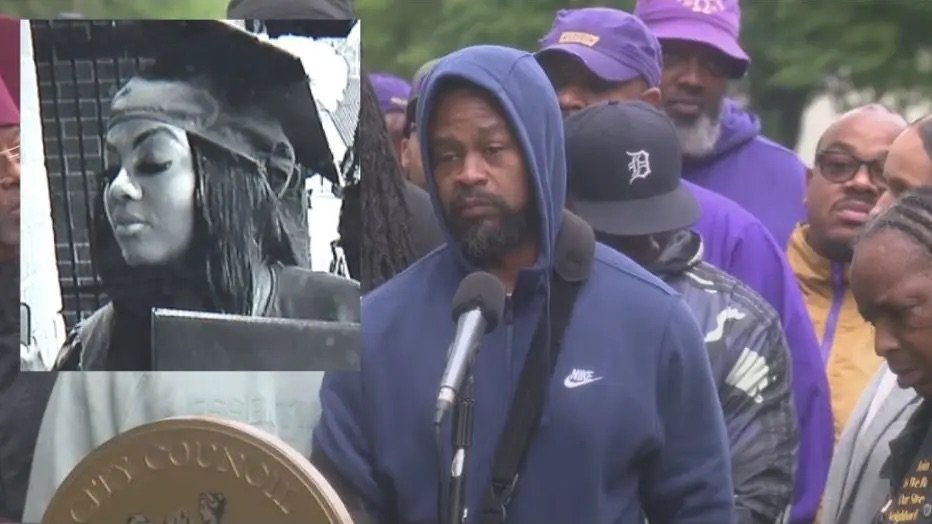
Serious questions
Our community has been shaken by a mass shooting unlike any we have experienced. Early Sunday morning, during the July 4th weekend, 21 people were shot and two were killed, a 20-year-old woman and a 21-year-old man, at a block party on the east side of the city. Nine guns were found at the site and over 100 shell casings were recovered. Over the week 27 people were shot at parties in six separate instances. Since May, the Detroit Police have received 500 calls reporting disturbances.
Community responses reflect deep concerns felt throughout the community:

Stonewall lessons
On June 28, 1969, people in a small, working-class gay bar in New York City rose up against police harassment. The Stonewall Rebellion marks the beginning of the modern queer movement and holds important lessons for us today.
In 1969 to be gay, lesbian, or trans was illegal everywhere but in the state of Illinois. In New York City, queer culture was shaped by the heavy hand of police harassment, subjecting people to physical violence, arrests, and threats, especially in the small bars and clubs that served as gathering places.
But on a hot night in June, at a time when the country was bursting with new political energies, the crowd of mostly young, black, Latinx and white working-class people pushed back, forcing the police to take cover in the bar. For five glorious nights people claimed the streets and the idea of “gay power” was born.

Illusion of control
Our institutions are afraid of us. This fear is driving authoritarian and controlling behaviors, eroding the fragile fabric of our civic life. The decision by the Mayor and the Detroit Police Department to close down 11 public parks during the annual fireworks display has sparked renewed outrage. Once again, we are told “public safety” is the most important thing. And this “safety” can only be achieved by a heavy police presence, scrutinizing people, restricting what they can carry, and where they can go. Getting much less attention than the park closures are reports of check points set up around the downtown area. People were stopped and forced to produce identification, often before being allowed to go to their own homes.
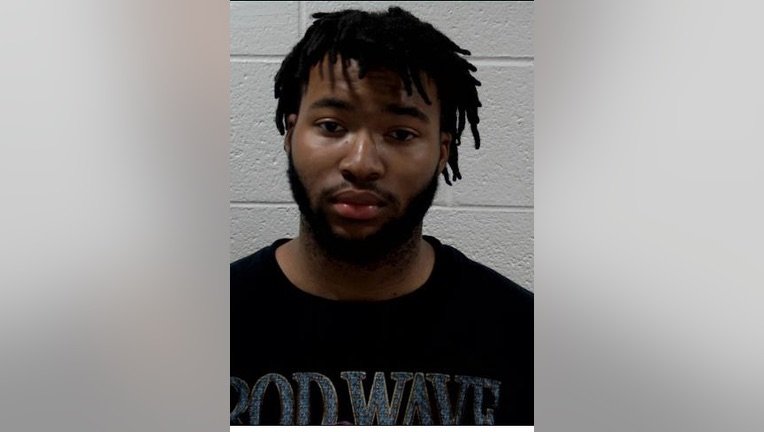
Setting boundaries
The recent tasing by a Detroit police officer of a 10 year old boy has sparked justifiable outrage. The incident at a birthday party was captured by a relative on video, widely circulated on social media, and reported in the mainstream press. It provided some of the context for the renewed demands that the Board of Police Commissioners (BOPC) assume responsibility for putting boundaries on police behavior. The BOPC has fallen woefully short of its oversite obligations. They voted against the recommendation of the police chief to suspend the officer involved without pay.
At this week’s BOPC meeting Congress person Rashida Tlaib helped sharpen the debate around the lack of oversight by the commission. In early June she wrote to the commission saying that the Detroit Police were targeting legal observers who attend demonstrations to protect first amendment rights. Tlaib wrote:

DPD Lessons
The Detroit Police Department has learned nothing over the last five years; or the last several decades.
The moral outrage that emerged after the police killing of George Floyd was met almost immediately by increased police violence. In city after city, police used excessive force and escalated tensions. Reports of police misbehavior uniformly concluded that generally the police made things worse, causing injury, trauma, and death. Detroit was no exception. The police brutally attacked demonstrators, and when demonstrators attempted to hold them accountable, the police doubled down, charging organizers with conspiracy.
Ultimately the demonstrators prevailed in court, winning a million dollar settlement.

Cherished spaces
The student encampments established to demand a cease fire, the end of US military aid to the Israeli government, and divestment of university funds in war making have offered valuable contributions to peace making. These contributions are now part of how we understand our world and will persist long after the encampments have disappeared.
On a conceptual level, the encampments have shattered the decades long effort to repress public conversations about the call by Palestinians to Boycott, Divest, and Sanction (BDS) the state of Israel. The efforts to outlaw boycotts, limit the actions of public bodies, and label BDS antisemitic, have crumbled. The term BDS is now widely understood as a critical call for engaging people across the globe in campaigns that can directly influence governmental and corporate support for war making.

Contrasting events
Early Thursday morning a combine police force in riot gear cleared the encampment on Wayne State University’s campus. As with almost every campus occupation across the country, the police used tactics of violence and intimidation against a peaceful gathering of students and their supporters. At one point US Congressperson Rashida Tlaib confronted police for assaulting a young woman and ripping off her hijab.
After the removal of the encampment students gathered to continue protests. Later in the day they regrouped at the Detroit Detention Center for the release of the 12 people arrested. It was reported that one student had to go to the hospital because of how she was treated by police.

Spirit of indivisibility
This week the University of Michigan brutally shut down the student encampment established in solidarity with Palestinians. Nearly 3,000 students have been arrested across the country as police, at the request of university officials, use violence to repress and punish dissent.
By now two things are clear. First, the calls to divest, boycott, and sanction Israel represent a shift in public perceptions and will continue to grow. Second, repression will become more brutal.
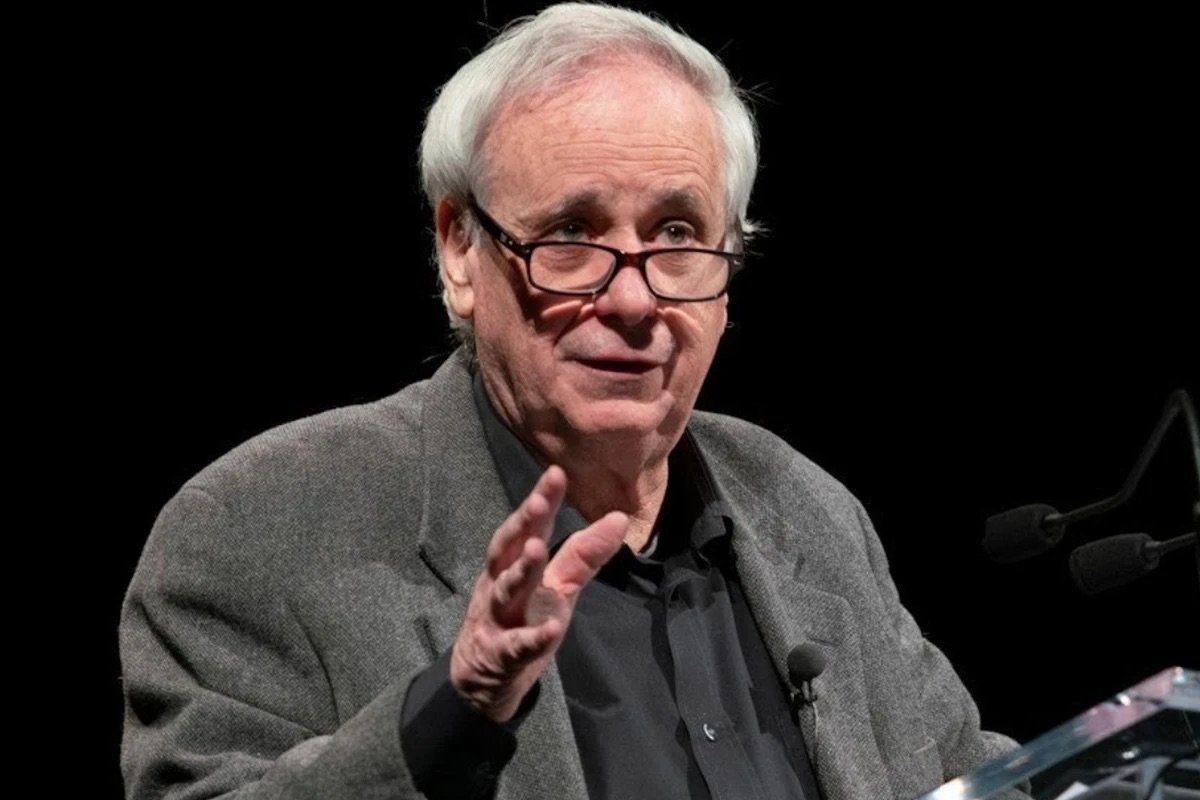
Outrage at airport
Professor Ilan Pappe was in Detroit for a series of public conversations about the ongoing genocide in Gaza and what we can do to stop it. The events were packed. But upon his arrival he was detained at the airport by the F.B.I. The agents questioned him for two hours, wanting to know about his Arab and Muslim friends, and if he was a supporter of Hamas. They took his cell phone and copied the contents. He wrote of the encounter in a Facebook post saying:
The two-men team were not abusive or rude, I should say, but their questions were really out of the world! Am I a Hamas supporter? Do I regard the Israeli actions in Gaza a genocide? What is the solution to the "conflict" (seriously this what they asked!) Who are my Arab and Muslim friends in America... What kind of relationship [do] I have with them?
"They had [a] long phone conversation with someone, the Israelis?" he added, "and after copying everything on my phone allowed me to enter."
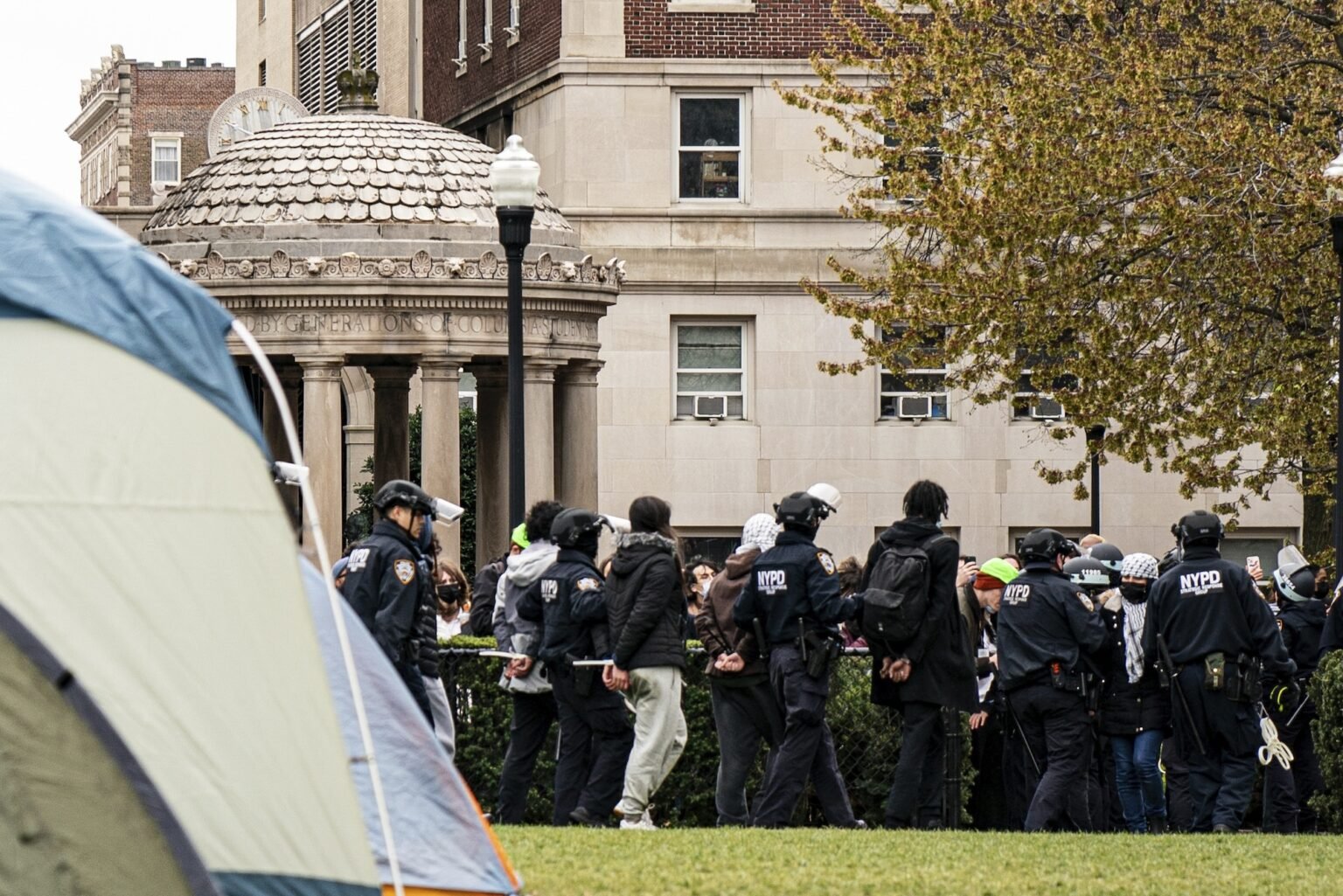
If not now
The removal of student encampments should be opposed by anyone concerned about our future. The use of violence against them is unconscionable. University presidents who called police on to a campuses should be the ones removed.
The world is shifting rapidly, and most presidents are on the wrong side of history.
Across the globe, energized by the courage of students, people are surging against corporate states that have deemed human life disposable. Sophisticated understandings emerging from these protests are providing a critical perspective on the interconnectedness of racialized capital, settler colonialism, military force, and the degradation of people and the planet. The encampments are providing new political spaces as students experiment with ways of living and being together that reflect intentional values of care and intellectual curiosity.
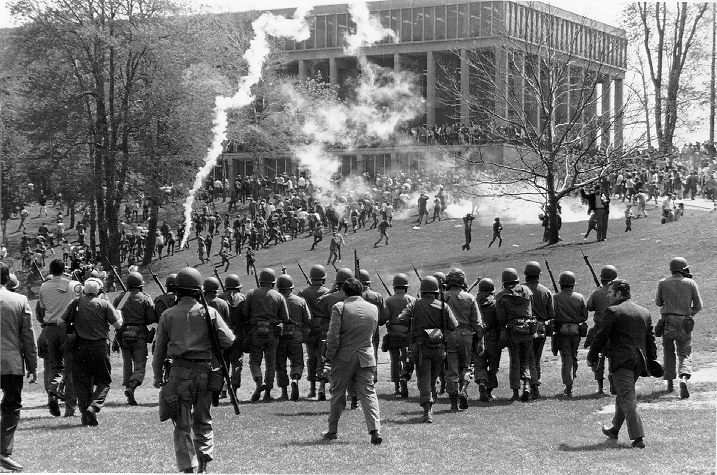
Now and then: student springs
On May 4, 1970, the Ohio National Guard shot and killed peaceful student protesters. In 13 seconds, soldiers fired 67 rounds killing four students, and wounding nine other.
The images of these killings rocked the country.
The images emerging from over 200 campuses today call upon us to support and protect our young people and their demands for peace and justice. The use of force to silence students is reprehensible. No city or state police should be allowed on to a campus. No National Guard should be called in. History tells us where this leads.
Unless we act now to protect and support the freedom of people to gather and demonstrate against injustice, those in authority will only accelerate their use of violence.

Students moving
The global protests against the Israeli government’s genocide in Gaza have been given renewed energy with the growing US student movement for a ceasefire and end to the occupation. For months individuals and organizations worldwide have been giving public voice to calls for a ceasefire in every imaginable way. Public statements, petitions, vigils, marches, blocking highways and bridges, swarming airports, demonstrating at sporting events, resisting taxes, following legislators, and occupying public spaces have all been designed to demonstrate a growing demand an end to the killing. Soon a ship with volunteers from over 40 countries is hoping to deliver 5,000 tons of aid to Gaza, breaking the Israeli blockade.

Nuclear moment
The world is closer to nuclear war than at any time in recent memory. The Israeli attack on the Iranian embassy in Syria, killing seven Iranian officers, promised to unleash a series of cascading events that could engulf us in even more deadly conflicts. The fact that the Israeli government seemed oblivious to the implications of this assault only underscored the dangers the world now faces.
After launching hundreds of drones and missiles in retaliation, most of which were destroyed before doing any damage, Iranian officials indicated they considered the matter closed and did not intend further escalation. The world was able to breathe a little more easily.
Then Friday morning, April 19, Israel again attacked a military base in Iran. Iran has not retaliated. Both Israeli and Iranian officials seem to be saying this means an end to the current round in the long standing “shadow war” between them. But we have already entered a new stage of international tensions.
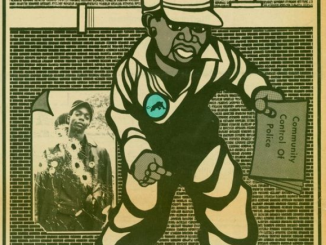
Work for the future
A new report on community initiatives and police practices documents the extraordinary levels of innovation in public safety emerging in communities across the country. The research examines the 50 largest U.S. cities and found that 44 of the 50 cities have an alternative 911 emergency response system, 34 of them are non-police centered, 30 cities have health centered responses to public safety, and 21 have “civilianization” initiatives that depend on unarmed city employees to handle incidents that are typically addressed by police. Overall, the study concluded “a remarkable 48 of the 50 cities have at least one program or initiative within those four categories.”
The report emphasizes that:
“When taken as a whole, these alternatives to police intervention are handling nearly every kind of call for service that police receive. In fact, for more than 90% of the 911 calls, there are already alternatives underway within major U.S. cities. In other words, these cities are collectively creating a blueprint for a dramatically different approach to community safety in the future.”

Breaking our silence
April 4th is a complicated date. It is the day that Dr. Martin Luther King was murdered in Memphis shortly after speaking in support of striking sanitation workers. It is also the day, one year earlier, when he spoke at Riverside Church in New York, calling for an end to the Vietnam war and for a radical transformation in values. He indicted the US government as the “greatest purveyor of violence” in the world and tied the oppression of people at home to the destruction of people abroad by military violence. He said of his experiences in the cities of the north:
As I have walked among the desperate, rejected, and angry young men I have told them that Molotov cocktails and rifles would not solve their problems. I have tried to offer them my deepest compassion while maintaining my conviction that social change comes most meaningfully through nonviolent action. But they asked -- and rightly so -- what about Vietnam? They asked if our own nation wasn't using massive doses of violence to solve its problems, to bring about the changes it wanted. Their questions hit home, and I knew that I could never again raise my voice against the violence of the oppressed in the ghettos without having first spoken clearly to the greatest purveyor of violence in the world today -- my own government. For the sake of those boys, for the sake of this government, for the sake of hundreds of thousands trembling under our violence, I cannot be silent.

Usual business
City councils and public bodies are taking action to restrict or eliminate the ability of citizens to make public comments and engage in protests. The recent proposal by University of Michigan to limit and punish student demonstrations is part of a dangerous nationwide trend. It is one of the ways that democracy is killed. Step by step people are told to shut up, go away, that their concerns are causing inefficiencies. Many of these restrictions on public participation are in response to the vigorous debates that have emerged over demanding that local governments and municipalities take a position demanding a cease fire in Gaza.
Since the October 7 attack by Hamas and the subsequent bombardment of Gaza, more than 100 cities have called for a cease fire. While there has been some national attention to efforts in major cities such as Atlanta, Chicago, Minneapolis, Detroit, and San Francisco, smaller towns and villages are also joining in the effort. Most resolutions call upon federal officials to take direct action demanding a cease fire and the provision of humanitarian aid.

Questioning decisions
This week the announcement that the District Detroit project will be delayed until at least 2025 surprised no one. It is a glaring reminder of the failure of the strategy of using public money to support private business development.
It has been a year since the Detroit City Council and the state of Michigan agreed to nearly a billion dollars in tax breaks and incentives to support the development of District Detroit, a multi building, mixed use proposal crafted by the Ilitch family business to develop the area north of their Little Caesars Arena (LCA). The LCA is also a private enterprise supported with public funds.

Pointing the way
We are in the midst of the month of Ramadan, a sacred time for those of the Islamic faith. It is a time of fasting, prayer, and reflection in community. As millions of Muslims pause the rhythms of daily life to reflect on faith and moral obligations, the rest of the world seems propelled toward a madness of mass destruction.
The level of violence we are inflicting on one another, in its ferocity and duration, is unprecedented since the end of the last global war nearly a century ago. From Haiti, Ukraine, and Gaza to our streets and bedrooms, violent assault and death are commonplace. Meanwhile ecosystems are collapsing at an ever-accelerating rate and the land and waters that support life are shifting toward disruption. The desire to protect ourselves, as individuals isolated from community, is driving those in authority to make decisions that only intensify these crises. Operating on the belief that more force will somehow bring peace; our government is in the absurd position of providing weapons with one hand and “humanitarian aid” with the other.

State of empire
President Joe Biden delivered a State of the Union Address that buoyed the hope of democrats doubting his energy and ability. In a relaxed, combative, and energetic mode, President Biden set forth his vision of hope and optimism for the country. He underscored the seriousness of this moment saying, “Not since President Lincoln and the Civil War have freedom and democracy been under assault at home as they are today.” Raising his voice he shouted, “What makes our moment rare is the freedom of democracy, under attack both at home and overseas.”
Many of his strongest moments came when he went off the script, bantering with republicans who jeered him, addressing the Supreme Court directly and chastising them for being out of touch, or speaking about his understanding of the pain of losing a child.

Creating new ties
In little more than 3 weeks, a multiethnic, multi-generational and multi faith collection of people coalesced to take a stand against President Biden’s refusal to use his influence for a cease fire. More than 100,000 voters cast ballots for uncommitted as a protest of US support of Israel’s assault on Gaza. Roughly 13% of all votes cast were uncommitted, and in some cities and towns more than half the people took a stand to demand a change in policy. Andy Levin, an activist with deep political roots in Michigan said on Democracy Now, “I’ve rarely seen such an organic and authentic movement come together. We really need actual change in policy, and I think we sent that message strongly.” The uncommitted campaign is now expected to move to other battle ground states. Dearborn Mayor Abdullah Hammoud said, "This coalition is one that wants to bring the morality back to this country because somewhere along the line, we have lost it."
